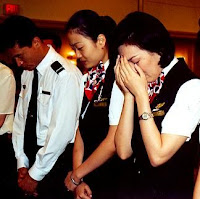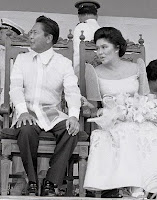Mendoza hostage investigation: What can be learned from Korean Airline disasters
 As investigations begin into the horribly bungled handling of the Mendoza hostage crisis that resulted in the deaths of eight foreign tourists, it is worth revisiting the impressive turnaround of South Korea's flag carrier Korean Airlines. In the 1980's and 1990's, Korean Airlines (KAL) had become a case study of deadly dysfunction. Many innocent passengers had died in air disasters involving KAL aircraft as a result of appalling cases of human error -- deadly lapses in judgement, failures in communication among cabin crew personnel, and a lack of commitment to international standards.
As investigations begin into the horribly bungled handling of the Mendoza hostage crisis that resulted in the deaths of eight foreign tourists, it is worth revisiting the impressive turnaround of South Korea's flag carrier Korean Airlines. In the 1980's and 1990's, Korean Airlines (KAL) had become a case study of deadly dysfunction. Many innocent passengers had died in air disasters involving KAL aircraft as a result of appalling cases of human error -- deadly lapses in judgement, failures in communication among cabin crew personnel, and a lack of commitment to international standards.In my December 2009 article Lots of action underpinned by very little thinking, I cited an insightful account of the plight of KAL written by Malcolm Gladwell in his excellent book Outliers which I summarised as follows...
Another case study explored extensively in Outliers involves the appalling safety record of Korean Airlines (KAL) in the 1980's and 90's. Among a number of other incidents, there was one KAL flight that was accidentally shot down by Soviet fighters planes after unintentionally straying into hostile airspace and another one that crashed as it attempted to land in Guam.
The approach taken to rectify the deep problems that beset KAL and the solutions identified are eye-openers, specifically because they could just as easily be potentially applicable to the systemic issues in Philippine Government, the police, and the Media; all of which revealed themselves to the world in living colour during the Mendoza hostage crisis...
An extensive study to analyse safety and operational practices was mounted and the solutions implemented based on these have since yielded promising results. One of the key findings involved how KAL's aircraft crew members communicated with one another in the cockpit. The study revealed that a particular cultural trait of Koreans -- extreme deference to authority -- made it a monumental challenge for co-pilots and flight engineers to speak out assertively whenever they identified potential problems or disagreed with the captain's decisions. It did not help the Koreans too that English happens to be the lingua franca of the global aviation community and air traffic controllers in airports all over the world spoke a particularly assertive flavour of it. Recognising all this, KAL designed its new training programs around ingraining new behaviours that mitigated the effects of Korean cultural traits on cockpit crews' behaviours. English language training was also significantly stepped up to boost crew members' proficiency and make them more competent communicators in-step with the larger aviation community.
The main underpinning feature in the approach taken by the Koreans to investigating the issue, identifying problems, and developing solutions was a willingness to examine the very fundamental traits of their own cultural character.
In the coming weeks, it is important that Philippine investigators see the Mendoza hostage incident as the outcome of a system of dysfunctional elements that profoundly infect Philippine society over a macro scale like a malignant cancer.




The Aquino government fashionably displays the cultural character that we have -- of investigative bodies, exposes and scandals. Ang favorite line ko of the new president is something like going to the bottom of the matter or finding the culprit and will make him/her pay. 2nd month pa lang ilang beses na akong nakabasa at nakarinig n'yan from President Noynoy. ilang years pang ganyan eh magiging lumang tugtugin na yan, tsk-tsk.
ReplyDelete